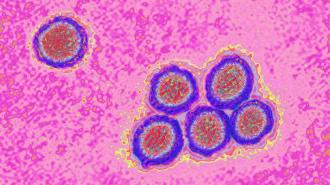A new meningitis vaccine outperformed an existing shot in a phase 3 trial, inducing a stronger immune response against four bacteria — and offering the only protection against a fifth.
The challenge: Meningitis is a condition in which the tissues surrounding the brain and spinal cord become inflamed. The most common type is caused by viruses, but the most serious type is triggered by bacteria — it can be fatal within just a few hours.
There isn’t a meningitis vaccine to protect against the emerging strain meningococcal X.
Antibiotics can clear the infection, but even with treatment, 10% of people who contract bacterial meningitis die. If left untreated, 70% of patients will die. Those who recover can have life-long problems, including hearing loss, seizures, and learning difficulties.
There are meningitis vaccines, including several that protect against four common strains of meningococcal bacteria. However, issues with the supply and cost of the vaccines have limited their rollout in the area of the world that most needs them: the “meningitis belt,” a stretch of sub-Saharan Africa at high risk of meningitis epidemics.
Additionally, there isn’t a meningitis vaccine to protect against meningococcal X, a strain lately emerging in the meningitis belt.
What’s new? Researchers from the Serum Institute of India, the world’s largest vaccine manufacturer, and Path, a nonprofit health organization, have now developed a meningitis vaccine designed to protect against five bacterial strains, including X.
In June 2021, they launched a phase 3 trial of the vaccine, NmCV-5, in two countries in the meningitis belt: Mali and Gambia.
The new meningitis vaccine induced “generally higher” immune responses than the quadrivalent shot.
During the trial, 1,800 healthy people ages 2 to 29 were vaccinated against meningitis. About 1,200 of them received the new vaccine, while the rest were given an already approved shot (MenACWY-D) that protects against four bacterial strains.
After 28 days, blood samples revealed that the new meningitis vaccine not only induced a strong immune response against the X strain, but also induced “generally higher” responses for the other strains than the quadrivalent shot.
Looking ahead: The researchers are hopeful the trial data will encourage the WHO to license the shot to control future epidemics. They say their use of “cost-effective methods” for production means the vaccine should cost less than existing quadrivalent vaccines, while providing more protection.
“We are excited about the results of this study,” said co-author Ed Clarke. “We expect NmCV-5 to provide children and young adults with reliable protection against meningitis caused by the meningococcal bacteria.”
We’d love to hear from you! If you have a comment about this article or if you have a tip for a future Freethink story, please email us at tips@freethink.com.
